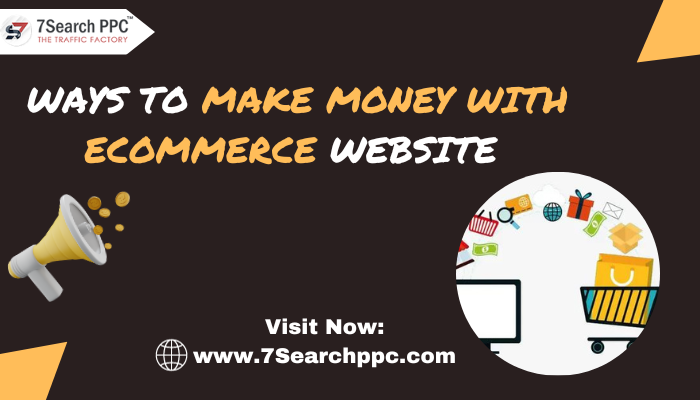Introduction:
In today's fast-paced digital world, ecommerce has become an indispensable part of the global marketplace. If you're a business owner with an ecommerce website, you're likely always on the lookout for new and innovative ways to monetize your ecommerce platform effectively. One powerful tool in your arsenal is Pay-Per-Click (PPC) advertising, and in this blog, we'll delve into 7 lesser-known ways to leverage 7Search PPC to optimise your ecommerce revenue.

Leverage Long-Tail Keywords:
Long-tail keywords are specific keyword phrases that potential customers use to search for a particular product or service. While short and popular keywords may have high competition and costs per click, long-tail keywords are often less competitive and can be more cost-effective. Utilise 7Search PPC to bid on these long-tail keywords related to your products or services to drive targeted traffic to your ecommerce website.
For example, instead of bidding on "shoes," consider bidding on "comfortable running shoes for women." The latter may have less competition and attract potential customers with a higher purchasing intent.
Use Negative Keywords Strategically:
In any PPC campaign, using negative keywords strategically is crucial. Negative keywords are terms for which you don't want your ads to be shown. By identifying and incorporating negative keywords in your 7Search PPC campaign, you can save money and ensure your ads are displayed to a more relevant audience.
For instance, if you sell high-end luxury watches, you might want to add "cheap" or "affordable" as negative keywords to prevent your ads from being displayed to individuals looking for budget-friendly options.
Optimise Ad Copy and Landing Pages:
Crafting compelling ad copy and designing optimised landing pages is vital for a successful PPC campaign. Use 7Search PPC to test different ad variations and analyse their performance to determine what resonates with your audience. Additionally, ensure that the landing page aligns seamlessly with the ad's messaging, creating a cohesive user experience that increases the likelihood of conversions.
Experiment with varying ad headlines, descriptions, and calls to action to understand what drives the highest engagement and conversions.
Implement Geo-Targeting:
Geo-targeting is a powerful feature offered by 7Search PPC that allows you to target specific geographic locations. Depending on your ecommerce business's nature, you can target users based on their location, whether it's a city, region, or country. This ensures that your ads are shown to a relevant audience, increasing the probability of conversions and reducing unnecessary ad spend.
For example, if you operate an online clothing store and offer international shipping, you can use 7Search PPC to target countries where you have a high customer base or see potential for growth.
Utilise Ad Extensions:
Ad extensions are additional pieces of information that can be displayed alongside your ad, enhancing its visibility and providing more value to potential customers. 7Search PPC allows you to incorporate various ad extensions, such as site link extensions, callout extensions, and location extensions.
Leverage these extensions to showcase additional product categories, highlight special offers, or display customer reviews, encouraging users to click on your ad and explore your ecommerce website further.
Retargeting with Display Ads:
Retargeting involves showing ads to users who have previously visited your ecommerce website but didn't make a purchase. 7Search PPC enables you to implement retargeting campaigns using display ads, which are shown across the web on partner websites to remind users of your products or services.
Set up retargeting campaigns through 7Search PPC to keep your brand in front of potential customers and entice them to return and complete a purchase, boosting your ecommerce revenue.
Monitor and Optimise:
Continuous monitoring and optimization are key to a successful 7Search PPC campaign. Regularly analyse your campaign's performance, track important metrics like click-through rates (CTR), conversion rates, and return on ad spend (ROAS), and make data-driven decisions to improve your strategy.
Experiment with different bidding strategies, ad placements, and targeting options to find the optimal mix that maximises your ecommerce website's profitability.
Conclusion:
7Search PPC is a potent tool to make money with ecommerce websites, offering a plethora of strategies to enhance your revenue. By focusing on long-tail keywords, employing negative keywords, optimising ad copy and landing pages, implementing geo-targeting, utilising ad extensions, retargeting with display ads, and continuously monitoring and optimising your campaigns, you can drive targeted traffic and boost conversions, ultimately increasing your ecommerce revenue. Embrace these lesser-known strategies and unlock the full potential of 7Search PPC for your ecommerce venture.
FAQs
1. How do I get started with 7Search PPC for my ecommerce platform?
Getting started with 7Search PPC involves creating an account, conducting thorough keyword research, designing compelling ads, and setting a budget for your campaigns. Start by signing up on the 7Search platform and familiarising yourself with its features.
2. What are some common mistakes to avoid when using 7Search PPC for ecommerce?
Common mistakes include inadequate keyword research, poorly designed landing pages, improper budget allocation, and neglecting campaign performance analysis. Avoid these pitfalls by conducting thorough research and continuous optimization.
3. Is 7Search PPC suitable for small ecommerce businesses?
Yes, 7Search PPC can be a great tool for small ecommerce businesses. It offers a cost-effective way to reach a targeted audience and can be tailored to fit smaller budgets while still delivering valuable results.
4. How can I measure the success of my 7Search PPC campaigns?
Use metrics like click-through rate (CTR), conversion rate






